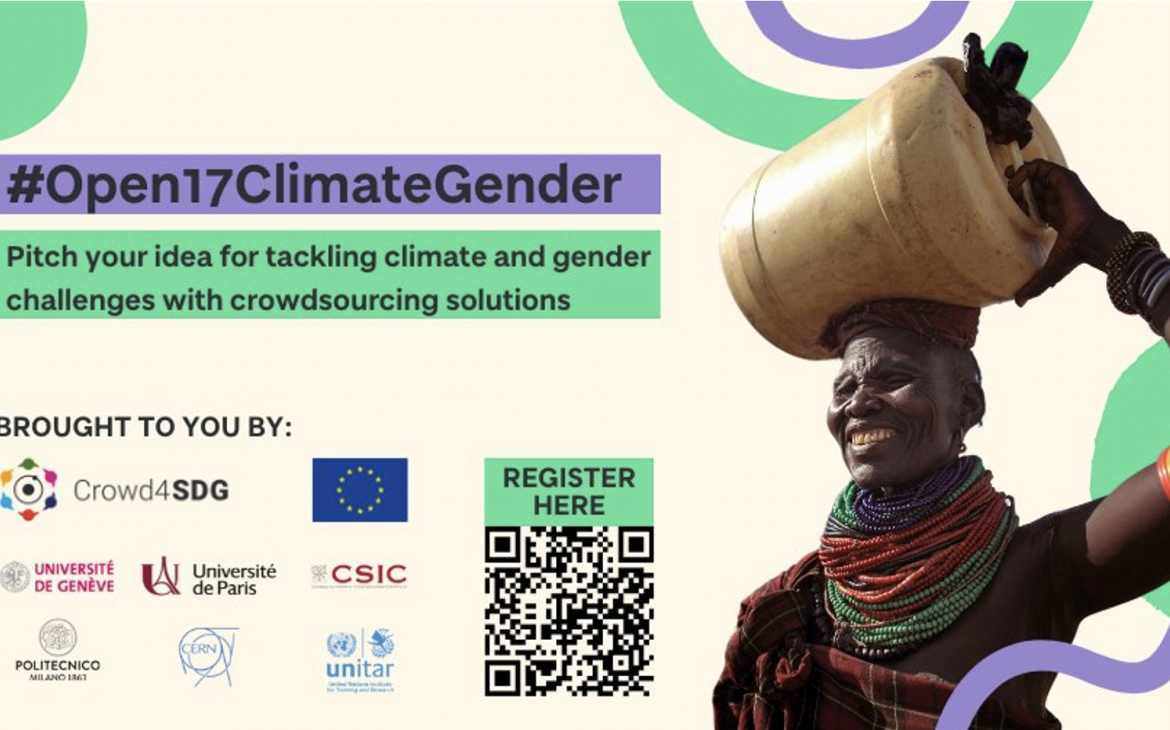In August 2021, Crowd4SDG launched the second GEAR Cycle of the project. This year’s GEAR Cycle focuses on two Sustainable Development Goals (SDGs) – SDG 13 on Climate Change and SDG 5 on Gender Equality.
GEAR Cycles include four phases in its implementation: Gather, Evaluate, Accelerate and Refine. The first phase, Gather, kicked off in August with the launch of a call for projects for Open Seventeen (017). This year’s call focused on projects tackling the many challenges related to climate change and gender issues, with the application of crowdsourcing solutions. These sourcing solutions depend on the engagement of ordinary citizens and they are key elements in the projects’ proposals. In terms of scope, projects tackle issues on a community, country, regional or even global scale.
UNITAR held a Crowd4SDG panel discussion, “Unleashing the Potential of Citizen Science Data for Monitoring the SDGs,” which was a great opportunity to ask National Statistical Organizations (NSOs), and international organizations, about the various challenges they face when it comes to addressing issues related to the climate change-gender nexus. As many have pointed out, the effect of climate change on men and women is not the same. However, this topic suffers from a significant lack of data which makes it difficult to formulate and implement evidence-based policies. Following the panel discussion, several challenges were formulated for the GEAR Cycle 2 project:
- Measuring the different impacts of disasters on women and men.
- Assessing women’s vulnerability to the effects of climate change on natural resources.
- Improving data on women’s participation in environmental management.
- Measuring the health of ecosystems in a systemic way with women’s contribution.
- Crowdsourcing for climate change resilience and gender equality.
Ms. Elena Proden, Senior Specialist, Strategic Implementation of the 2030 Agenda Unit, provided an explanation of the challenges in a short video.
A total of 150 project proposals, including a 1-minute video pitch, have been submitted via the Goodwall platform. The proposals were evaluated against four criteria: Novelty, Relevance, Feasibility and Crowdsourcing. Out of the 150 projects proposals, 15 were selected to go through to the next phase: Evaluate.
The 15 teams whose projects were selected had the chance to participate in the #Open17Challenge, an intensive 5-week online interactive coaching programme during which the teams are mentored by experts from the UN, and top European Research Labs, to enhance their pitching skills, fine tune their projects, especially in relation to the theory of change, and to learn how to use the relevant crowdsourcing tools for data collection, data classification, decision-making and social media analysis. With this stewardship, and after jury evaluation of the final pitches, five teams successfully graduated to go on to the next phase: Accelerate - an online challenge-based innovation workshop, co-organized by CERN IdeaSquare (tentatively scheduled for January 2022), where the teams will be able to prototype their projects. The projects cover the following solutions:
- Women - A project that makes it easy to collect, analyze, and visualize data on women and climate change.
- Donate Water - A project aimed at providing drinking water all year round for target rural communities in Nigeria faced with challenges of access to clean water.
- Andape Institute - A project focused on designing an ecological sidewalk from recycled materials (with less cement), using crowdsourcing to help research.
- Climate Gender Justice - The impact of climate change on women's and girls' sexual, and reproductive, health and rights.
- Water Warriors - An app to help people get through to emergency services and to a hear female voice.
Only two of these teams will be selected for the final phase where they will present their project to the UN, NGO partner organizations, and impact investors, during the 4th Geneva Trialogue in Switzerland, (tentatively scheduled for March 2022).
Crowd4SDG is an EU-funded research project exploring how citizen science can track progress towards the SDGs and how grassroots innovation can help achieve such progress. UNITAR'S Strategic Implementation of the 2030 Agenda Unit is a member of the consortium along with the University of Geneva, the European Organization for Nuclear Research (CERN), the Spanish National Research Council (CSIC), the Politecnico di Milano, and the Université de Paris-CRI.


